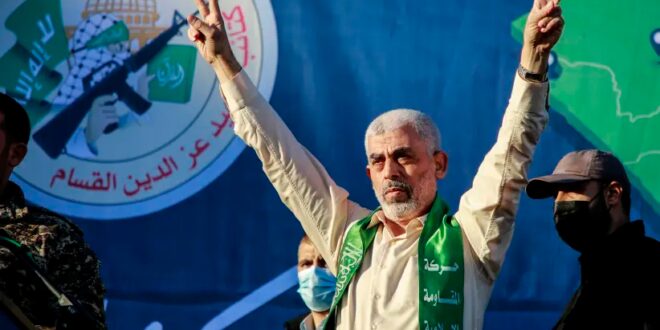Sinwar boasted that the last round of bloodshed with Israel represented only “a small battle,” and that the next war will be more significant. There is no pretense of a move to peace.
The 11-day war between Israel and Hamas last month started after the terrorist group launched seven rockets at Jerusalem as Israel was celebrating Jerusalem Day. It continued as Gaza-based terrorist organizations released barrages of more than 4,000 rockets and mortars indiscriminately on Israel. Each of those rockets is a war crime.
Operation Guardian of the Walls took a toll in human lives; in the sphere of physical and mental health, and, of course, economically – on both sides, in Israel and in Gaza. As has happened in previous operations and mini-wars between Israel and Gaza, no sooner was it over than the effort began to mobilize the West and the Arab world to pour more funds into the Gaza Strip to rebuild it. There was the usual talk of helping solve the severe poverty there in an effort to prevent economic despair that could erupt into another round of war.
Unfortunately, while sound in theory, this aid in practice ends up helping boost Hamas. Even worse, it signals to Palestinians under the Palestinian Authority areas in the West Bank that violence, rather than cooperation, pays off.
If the past teaches us anything, it’s that Hamas has no intention of using the funding to peacefully rebuild its quasi-state to benefit all those living there. It was true after the 2014 war, and was proven again over the weekend in a speech by Yahya Sinwar, Hamas leader in Gaza.
As noted by The Jerusalem Post’s Khaled Abu Toameh, Sinwar gave a defiant “victory speech” claiming that Israel had failed to destroy “the capabilities of the Palestinian resistance” during Operation Guardian of the Walls. He also claimed that Israel destroyed less than 3% of Hamas’s tunnels.
“Our people proved to the occupation and the rest of the world that our ummah (Muslim community) is ready to defend al-Aqsa Mosque,” Sinwar said.
To the chants of “Allahu akbar!,” Sinwar listed the ways in which he considered Hamas had won the latest round of warfare, describing them as “strategic goals.” These included demonstrations on the Lebanese and Jordanian borders with Israel, Palestinian rioting, rocket attacks on Tel Aviv, thwarting Israel’s (perceived) plan to divide al-Aqsa Mosque, and more.
Most sinister of all, the leader boasted that the last round of bloodshed with Israel represented only “a small battle,” and that the next war will be more significant.
There is no pretense of a move to peace.
In this context, it is important to remember what happened in Gaza regarding UNRWA, the UN agency dedicated to helping Palestinian “refugees” – a unique status that can be passed on through the generations in the case of Palestinians, but to no other group of refugees in the world.
Palestinian factions last week declared Matthias Schmale, UNRWA director of operations in the Strip, persona non grata, and that he would not be allowed to return to the territory. Schmale’s deputy, David de Bold, was similarly blacklisted by the Hamas leadership. The factions absurdly claimed that Schmale was “a major reason for the suffering of thousands of Palestinian refugees and UNRWA employees in the Gaza Strip.”
The real reason for Schmale’s ousting is that he refused to abide by Hamas’s false narrative.
In an interview with Israel’s Channel 12, Schmale said that the Israeli strikes on the Gaza Strip appeared to be carried out with “sophistication” and “precision,” and that Israel had made an effort to avoid civilian casualties.
Following an uproar by the terrorist organizations, Schmale released an apology on Twitter, but this was obviously not enough for Hamas and the other Palestinian terrorist organizations there. Hamas wants nothing that could infer that Israel is doing all it can to abide by the highest moral standards when forced to fight, and nothing that shows Hamas’s use of its own population as human shields.
This should raise serious questions about the kind of aid that can be provided to Gaza to help alleviate the suffering of the ordinary Palestinians – suffering caused by its own leadership there. Sinwar’s comments show clearly that Hamas has no intention of ending the hostilities. Efforts to help Gaza must take this into account. A way must be found to help Gaza without strengthening Hamas.
 Eurasia Press & News
Eurasia Press & News


